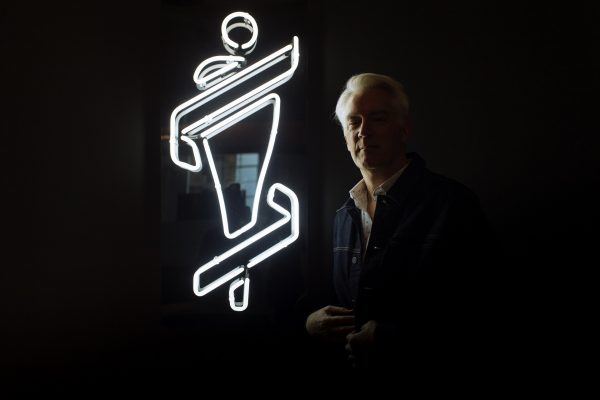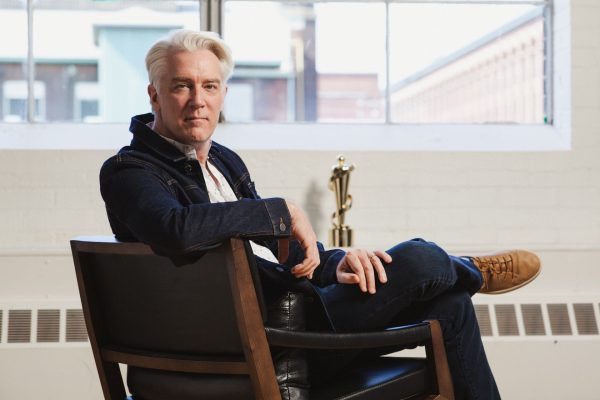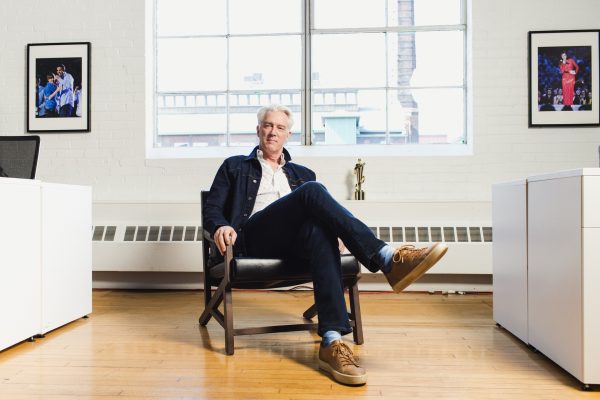CEO and president of the JUNO Awards, Allan Reid, has played a key role in helping our country’s recording industry to grow up.
By Meghan Yuri Young
Photography by Max Power
June 2023 Update: Our interview with Allan Reid occurred during the 2022 JUNO Awards season. While the Awards have moved on to other cities, our interview speaks to the importance of this event to Toronto arts and culture. After you check out the interview, experience some of the incredible Canadian, and global, musical artists who pass through Toronto by checking out our music event listings.
Allan Reid is like a proud dad. As the CEO and president of the JUNO Awards — the nation’s biggest recording industry awards — he knows each of the nominees. Not only that, but he also knows their history, their come-up, and their achievements. Allan’s knowledge spans across all of the categories, and then extends to include The JUNOs themselves.
Having been in the industry for nearly 30 years, Allan’s pride and passion comes as no surprise. It’s also safe to say, he’s had a front row seat to the Canadian music industry’s evolution. Allan has watched our music scene grow up, and most importantly, to continuously change to reflect the needs and wants of its homegrown artists and its audience.
The JUNOs might be in their 50s, but Allan shows us that the energy of this celebration of Canada’s music is young, vibrant, full of promise — and still growing.

Meghan Yuri Young: Allan, you have a pretty cool job. Tell us a little about who you are and what you do.
Allan Reid: I’m the president and CEO of the Canadian Academy of Recording Arts and Sciences (CARAS) and the JUNO Awards as well as MusiCounts, which is our charity. I’ve been at the helm of the organization for just seven years, but I’m a lifelong music industry person. I was the head of A&R — the person involved in finding, developing, and signing Canadian artists — at Universal Music for over 20 years. So, my whole life has been built around and ingrained in the Canadian music industry, especially Canadian artists.
I feel extremely honoured to now be leading organizations whose main function is to help promote and celebrate Canadian artists, to be part of an amazing platform helping established and emerging artists be seen and heard.
MYY: In 2022, you held the JUNOs in Toronto. How did it feel to be back in one of the major hubs fo Canadian talent and music?
AR: We celebrated the 40th anniversary of the JUNOs in Toronto, back in 2011. [In 2021], we were supposed to hold our 50th anniversary in Toronto at Scotiabank Arena. But all that had to go by the wayside, unfortunately, due to COVID. So, [we called the 2022 awards] our JUNOs reunion, so to speak. Both the City of Toronto and the Province of Ontario were immediate in their acceptance of having us come back for the 51st, since we didn’t get the 50th to be what [we expected].

MYY: In 2022 (and 2023), you got Simu Liu to host the JUNOs! How did getting this global megastar to host come about?
AR: We were thrilled that Simu agreed to be part of the JUNOs. When we approached him to host, he was immediately like, “I would love to do this. I grew up on the JUNOs, it’s a lifelong dream to host the JUNOs.” He was thrilled, and we couldn’t [have been] more excited to have a superhero on our stage.
He’s also a music lover, that’s a big part of it. He loves Canadian music. He knows Canadian music. And when we talk about talent like him from Toronto, there’s so much found in the music industry, too. You think about Deborah Cox, as our Hall of Famer from Scarborough. You’ve got Mustafa, an emerging artist from Regent Park. Shawn Mendes from Pickering. Haviah Mighty [from Brampton]. There’s so much music coming out of this city, this province, this country.
“I feel extremely honoured to now be leading organizations whose main function is to help promote and celebrate Canadian artists, to be part of an amazing platform helping established and emerging artists be seen and heard.”
MYY: Speaking of incredible music coming out of our country, let’s talk a little bit about the Contemporary Indigenous Artist or Group of the Year category.
AR: Of course! It originally started back in 1994 and was called our Best Aboriginal Recording. It was actually started by Buffy Sainte-Marie. Buffy, Elaine Bomberry, and another artist named Shingoose came together and lobbied CARAS to create an Aboriginal Recording award.
Over the years, that category has existed. Then, the community came to us a couple years ago and said, “We really feel there needs to be a second category that celebrates traditional Indigenous music in this country.” What was happening was even though artists could submit into the Aboriginal Recording category, there was so much success happening for contemporary Indigenous artists, like A Tribe Called Red and William Prince, that the traditional drum music, the powwow music, wasn’t being celebrated. As Jeremy Dutcher called it, there was an Indigenous Renaissance happening. The community was able to demonstrate to us that there was a lot of music going unrecognized. So, this idea of splitting the category became really important to us.
It’s been a very important part of what CARAS does to make sure we’re shining a light on Indigenous artists who need to be seen and heard. There’s so much awareness of the challenges the Indigenous people have been through in this country. If we can do a little bit to give those artists a platform, to have their words and music heard, it’s important for us to do that.
MYY: There is so much awareness surrounding many issues nowadays. During the 2022 awards, Denise Jones received the Walt Grealis Special Achievement Award. Can you speak on why she’s important to Canadian music history?
AR: First off, the Walt Grealis Special Achievement Award recognizes an industry leader. We felt, being back in Toronto [in 2022], we wanted to find someone who really made a difference within the music community here and far beyond that. Denise was a Jamaican-Canadian entrepreneur. Unfortunately, she passed away a couple years ago. But it was really important for us to recognize her. She is the founder of Canada’s first Black-led talent and management agency.
NOW YOU KNOW: “[The 2022 Juno Awards was] actually a historic event because [it was] the first time [it was] held outdoors, at the Budweiser Stage.”
MYY: Oh, wow, that’s big.
AR: Yes. It took a real focus bringing Canadians, and primarily Toronto, reggae music. She was the first chair of the CARAS Reggae category as well. But I think what’s really interesting about Denise is her commitment to diversity, equity, and inclusion (DEI) is unmatched.
Well before DEI was a buzzword for everybody, throughout her entire career she made incredible strides with politicians, business leaders, and the media to make sure they acknowledged the value of Black music creators in the entertainment world. Through that, and through her company Jones and Jones Productions, they created one of the largest Afrocentric cultural events in Canada, called Jambana.
So, to have Denise be recognized was really important to us. She was an incredible mentor to so many people in this business, artists like Kardinal Offishall, business leaders like Vivian Barclay. She was an absolute trailblazer.
MYY: I feel like there are a lot of people, like myself, that weren’t familiar with either Denise herself or all that she accomplished in her life. The JUNOs actually highlights a lot of incredible women, isn’t that right?
AR: That’s right. If you look at our special award recipients [in 2022], three of them [were] diverse women. Deborah Cox is the first Black woman ever to be inducted into the Canadian Music Hall of Fame. Denise is the first Black woman to ever receive the Walt Grealis Special Achievement Award. Susan Aglukark is the first Indigenous woman to ever be given the Humanitarian Award. It’s not lost on us that part of our job at CARAS is to shine a light on these accomplishments and give space to those who will inspire the next generation, because that’s what it’s all about.
“It’s been a very important part of what CARAS does to make sure we’re shining a light on Indigenous artists who need to be seen and heard.”
MYY: How does it feel that it took this long for these firsts to happen?
AR: I think there’s been other firsts along the way, for sure. But one thing to note, to be considered for the Canadian Hall of Fame, for instance, you have to have a career that has spanned over 20 years. Minimum.
MYY: Oh, wow. Now we know.
AR: Yes, we do hear that all the time, why haven’t certain people been inducted? There are qualifiers. It can take 30, 40 years to get that opportunity to be inducted. We used to only induct one person a year. Now, it’s five.

MYY: Let’s talk about another first that happened in 2022: the TikTok JUNO Fan Choice Award. The relevance of embracing TikTok for emerging music artists seems almost indisputable.
AR: There’s no question that emerging talent is the future of the JUNO Awards and since TikTok has been around, they have had a major influence on the discovery of music. It’s not just for superstars like Mendes and Bieber to talk to their fan bases. It’s also an incredibly powerful tool for emerging talent to get their music seen and heard by millions of people.
“…Throughout her entire career, [Denise Jones, who was honoured in 2022 with the Walt Grealis Special Achievement Award] made incredible strides with politicians, business leaders, and the media to make sure they acknowledged the value of Black music creators…”